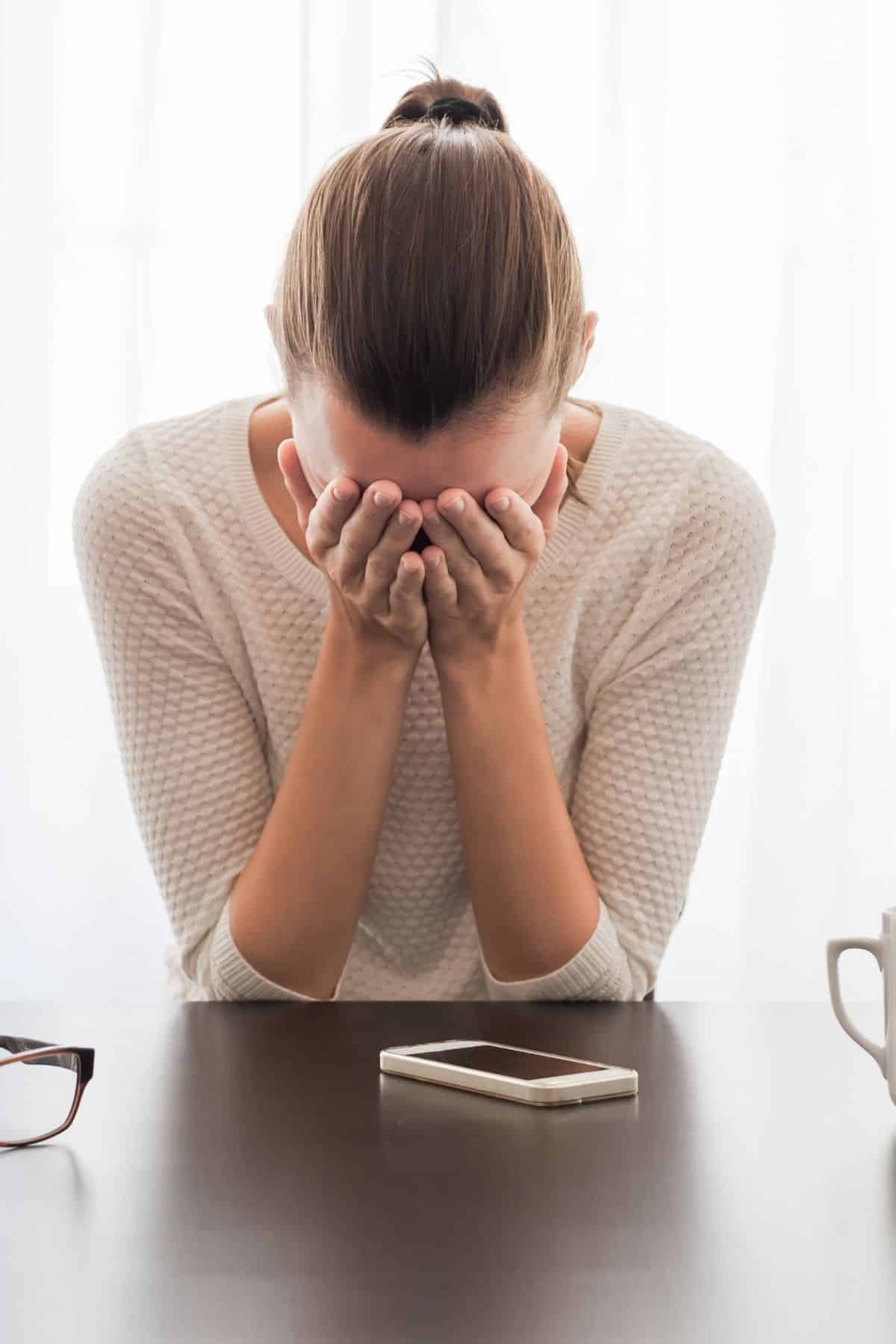Why Am I Always Tired: 10 Tips for Women
This article includes ten reasons and actionable tips for women who wonder, “why am I always tired?” The fatigue and lack of energy can be debilitating. Here are some tips to naturally stop feeling so tired and get your life back.

Feeling tired all the time is one of the top health complaints from women.
Certainly, there are legitimate and common reasons to having fatigue and exhaustion. If you are working long hours in a stressful job, raising young children, or have certain health conditions, then you probably aren’t feeling your best.
Lack of sleep is one of the most debilitating symptoms that you can experience. If you have made an effort to sleep more and manage stress, but you’re still feeling tired all of the time, then it’s important to figure out what might be causing all of that fatigue.
This article includes ten reasons why you might always be tired, plus some ways for you to combat fatigue.
While you may need to consult with a sleep specialist or another doctor to rule out other medical conditions, this article is a good place to start.
Reasons & Tips to Stop Feeling Tired All the Time
1. You’re not eating enough calories
Food provides us with energy and energy combats fatigue. If you’re currently on a diet or trying to watch your weight, there is a good chance that you’re not actually providing enough nourishment for your body.
If you are an active woman who is exercising regularly, but you are restricting calories, then you may start to experience fatigue and other health issues.
Unless you have been advised by a doctor, then don’t fall for the myth that women only need 1,200 calories a day. Intermittent fasting is another diet trend that can lead to under consuming calories and fatigue.
If you are confused by which foods to eat and how much, then it’s best to consult a functional medicine practitioner who can help you determine the best diet for your energy needs. See my related article on the differences between clean eating, paleo, vegan, keto, and Whole30 diets.
If you aren’t eating a quality diet with a balance of macronutrients like carbohydrates, fat, and protein, then you’ll also have unstable blood sugar levels which can lead to fatigue. This can definitely also be the case i you are fasting or trying the OMAD diet.
You can also check out my guide to healthy foods to eat every day for energy and nourishment. I also have a post with how to eat clean, including a diet plan.
2. Your hormones are changing or are unbalanced
Hormonal changes are inevitable for women.
Not only do we experience monthly changes with the menstrual cycle, but we also go through life seasons, including pregnancy, perimenopause and menopause (see how to eat for your cycle).
Perimenopause is a time in a woman’s life when the ovaries gradually begin to make less estrogen. Perimenopause can start as early as a woman’s mid-30s and last until menopause, the point where the ovaries stop releasing eggs altogether.
Fatigue is one of the main complaints of women going through hormonal changes like perimenopause and menopause. Estrogen, progesterone, thyroid hormones and adrenal hormones are all changing at this time and can contribute to fatigue.
This is also a common time for weight gain, especially around the stomach area. You can learn more in my article about how to reverse estrogen dominance naturally with diet and supplements.
Supplements can be very helpful during hormonal changes to fight fatigue. Consult a functional medicine doctor to get targeted support. Or, see my article with the best supplements for hormone balance.
Other good ways to combat fatigue caused by hormonal changes are by developing a good sleep routine, practicing meditation, staying hydrated, consuming balanced and nutrient-dense meals, and trying some low-impact exercises like walking or yoga.
3. Your diet is overly restrictive
While special diets are absolutely needed for food allergies and sensitivities, they can also lead to over-restriction, fears about food, and even mental health issues like eating disorders like orthorexia.
Some examples of restrictive diets include the vegan diet and the ketogenic diet.
While plant-based and keto diets can be used short-term under medical supervision, these types of diets usually aren’t ideal for the long-term. Read more about the potential risks of a vegan diet and the potential dangers of a keto diet.
Restricting entire food groups places added stress on our bodies that we just don’t need. Restrictive diets can also cause nutritional deficits which will make us extra tired.
The bottom line is that by expanding your dietary choices, you might resolve your possible nutritional deficiencies and combat your fatigue that way. In this situation, it’s best to work with a dietitian or nutritionist who has been trained in food restrictions. He or she can help you expand your food choices with support.
Ready to start eating clean but need support? Check out my Clean Eating Mini-Course that is designed for anyone new to eating a real food diet. Get my healthy shopping guide, recipes, and access to my private online support community. Join now.
4. Your thyroid gland is struggling
Hypothyroidism is the term given to underactive thyroid.
This condition occurs when the thyroid gland fails to produce enough thyroid hormones. Energy production within the body requires thyroid hormones. Therefore, an underactive thyroid can lead to low energy levels, making you feel weak and fatigued.
A simple blood panel can normally determine if your thyroid is underactive. Ask your doctor to test your thyroid stimulating hormone (TSH) levels, along with Free T3 and Reverse T3. He or she may order other thyroid tests as well.
The optimal range you want to see for TSH is anywhere between 1.0-2.5. Anything from 2.5-4.0 is slightly elevated, meaning your pituitary gland is telling your thyroid to pump out more TSH to boost thyroid activity.
A number above 4.0 is too high (some doctors are now considering a TSH over 2.5 as cause for concern), so talk to your doctor about treatment options. Unless you’ve had the right tests done to check your thyroid in the last 6 months, don’t assume that you’re thyroid is functioning optimally!
From personal experience, I can say that getting my thyroid hormone balanced was the fastest way for me to combat relentless fatigue. Once I increased my hormone intake, my energy improved literally overnight.
And, as a side note, if you are having trouble managing your weight, this could also be a result of having an underactive thyroid. So, ask your doctor about getting a thyroid blood test done ASAP. Or, you can order a thyroid test to do right at home without a doctor’s order.
If you have already been diagnosed with thyroid disease, you might want to read my article on the worst foods for Hashimoto’s.
5. You need to work on your sleep hygiene
Insomnia can be caused by hormone changes, stress, or many other reasons. But, undoubtedly, if you have insomnia, you will experience fatigue and always feel tired.
Lack of sleep is a common cause of fatigue and can lead to so many problems including heart disease, blood sugar issues, and obesity. The National Sleep Foundation recommends 7-9 hours of sleep for most adult.
My best advice for better sleep is to create a sleep routine.
Go to bed and get up at the same times every day or as often as possible. This will help reset your circadian rhythm and combat fatigue. Studies show that wearing blue blocking glasses in the evening can also help reset circadian rhythm for better sleep.
Other ways to improve sleep and help reduce insomnia include cutting back on caffeine and setting a “caffeine curfew” can help you sleep better and reduce feelings of fatigue.
Create a nightly routine of turning off all screens two hours prior to your desired bedtime. Take a bath, meditate, read a book, or write in a gratitude journal to help yourself wind down before bed.
Even having a simple sleep routine can work wonders to make sure you get enough sleep, plus can help you increase the quality of sleep.
6. You could be over-exercising
Believe it or not, it is possible to overdo it with your exercise routine which leads to fatigue. While the majority of people don’t exercise enough and lead a sedentary lifestyle, there are quite a few people who exercise too much.
Women are especially prone to overexercising, because they see it as a way to control their weight and improve their appearance. But, when you do too much physical activity, your body can see this as a stressor causing you to overproduce cortisol.
Too much cortisol will lead to sleep problems which will lead to fatigue and daytime sleepiness.
Either you won’t be able to fall asleep easily at night or you’ll wake up in the middle of the night and not be able to get back to sleep. This is a signal of chronic stress. You might also be so sore from over-exercising that it impairs your ability to sleep well.
When it comes to exercise, more is not always better. This is especially true if you are complaining about always feeling tired. Instead of going for a run, you may be better off taking a nap and then going for a gentle walk.
Monitor your sleep patterns and see if cutting back on your extreme exercise helps improve the quality of your sleep. You don’t want your exercise to contribute to your lack of sleep.
7. You may have a chronic infection
Most of us have infections that our immune systems keep at bay. For example, did you know that 95% of adults in the US have been exposed to Epstein-Barr virus?
It’s normal to have been exposed to viruses, but they can certainly lead to unexplained fatigue if they start to replicate and the immune system can no longer manage them. Some viruses that have been linked to a disorder known as Chronic Fatigue Syndrome including Epstein-Barr virus.
If you suspect you are fighting an infection from a virus, it’s important to work with a qualified healthcare practitioner to do the proper lab testing, plus to develop a health plan to deal with this medical condition.
8. You are experiencing food intolerances
Food interolarances are different from food allergies. An intolerance can show up anywhere from immediately ingesting a suspect food, to days later. The symptoms can be really wacky, too, including skin rashes, dry skin, restless leg, headache, fatigue, and many more.
The two best ways to know if you’re experiencing food sensitivities are to do an elimination diet or to do food sensitivity testing. You can also try a gluten-free and dairy-free diet to reduce two of the top major allergens.
After I did food sensitivity testing, I found out I am severely reactive to ginger and tomatoes, two well-known health foods. I started sleeping better and feeling less tired once I stopped eating foods that didn’t work well for my individual needs.
9. Your iron is low
Iron is necessary for optimal health.
Low iron levels have been shown to cause fatigue, with or without clinical anemia. Iron is important because it helps us transport oxygen from our lungs throughout our body in our blood. It also helps our muscles store and use oxygen.
Factors that can contribute to iron deficiency in the body include not eating enough iron-containing foods, lacking the cofactors needed for iron absorption, heavy menstruation, pregnancy, certain medications, and overconsumption of diuretics (coffee, tea, alcohol, soft drinks, and sugary fruit juices).
Low iron not only contributes to fatigue, but it can also affect memory and mental function. When iron levels are too low for too long, a person can develop anemia which will cause fatigue and many other very unpleasant symptoms.
The best sources of iron come from nutrient-dense foods like grass-fed beef, wild-caught shellfish, and organic spinach. It’s also a good idea for women of child-bearing age to take a daily iron supplement.
A simple blood test for ferritin can help determine if you’re at risk for low-iron related fatigue.
See all the best vitamins for women who are of child-bearing age.
10. You need more self-care
A lot of people are always on the go these days overworking themselves to the point of exhaustion. It’s important to take a break every once in a while and dedicate some much needed time to self care.
Some of my favorite forms of self care are taking moderate walks in nature, meditating, practicing yoga, or just taking a day off.
Not taking time to relax keeps you in a fight and flight state of mind, which is a major stressor and adrenal taxer.
If you find yourself losing interest in activities that usually energize you, then you probably need to take a break.
Make yourself a priority and remember to breathe every now and then. It’ll give you an energy boost and allow you to rest a bit.
FAQs
The most obvious reason is that you’re not sleeping well enough or long enough. Make sure you’re going to bed early enough that you can stay in bed at least 9 hours. This should help make sure you’re getting at least 8 hours of full sleep time, plus a little wiggle room to account for time to fall asleep and some time if you wake up in the middle of the night.
If you continue to feel sleep even after 7-9 hours of sleep, then consult your healthcare provider to rule out other reasons why you’re feeling sleepy.
This answer will be different for everyone, but the bottom line is that you need to identify the causes of your fatigue. The possible reasons listed below should be a good starting point, but you should probably talk to your healthcare provider about your fatigue if it lasts longer than a few weeks.
My Experience
Early in my health journey, I began experiencing chronic fatigue that had me complaining that I felt tired all the time. It took a lot of investigating and exploration to figure out the root causes of my tiredness and sleep disorders.
I had to switch doctors to find someone who would take me seriously when I complained about feeling tired. It made all the difference to have the right practitioner who listened to my concerns, the right lab tests, and the right person to interpret them.
Once I figured out some of the reasons I was tired all the time, I was able to make some changes to my diet, supplement routine, exercise routine, and more. Now, I consistently have better sleep quality and I generally wake up feeling refreshing and ready to take on the day.
Don’t Miss These Health Resources
Conclusions
If you’re experiencing fatigue that you just can’t shake, it’s important that you consider what might be the cause. You don’t want to feel tired all the time because it will keep you from experiencing all the best that life has to offer.
Don’t forget to join my newsletter list to get exclusive clean eating recipes and tips. The newsletter is 100% free with no spam; unsubscribe anytime.
About the Author: Carrie Forrest has a master’s degree in public health with a specialty in nutrition and is a certified holistic nutritionist. She is a top wellness and food blogger with over 5 million annual visitors to her site. Carrie has an incredible story of recovery from chronic illness and is passionate about helping other women transform their health. Send her a message through her contact form.
Note: this post is for informational purposes only and is not intended as medical advice. Please consult your healthcare provider for recommendations related to your individual situation.





















I have a dear friend who was just diagnosed with MS. She is incredibly tired after getting her first dose of Ocrevis. Do you have any suggestions for her? Her white blood cell count is low. Thank you for your articles. They are so relatable and very helpful!
Hi Nora, I would have your friend reach out to her healthcare provider for targeted support for her fatigue.
i’m going to try dairy free and gluten free and see if my itching goes away . low histamine diet .the yolk of the egg is good ?? when i have eggs my nose gets clogged .
i meant egg whites when i have eggs my nose gets clogged .
Egg whites are notorious for being allergenic. So, I would definitely skip the egg whites for now and just eat the yolks! Or, do an elimination diet and cut out all eggs for at least 6 weeks.
Great read. I too am always tired and this may be why!
I’ve dealt with #8 first hand! After cutting gluten and dairy from my diet, my energy has improved.
These are some real life reason why we always get tired. Eating healthy foods makes us body strong and we need a complete sleep at night.
I deal with fatigue daily due to an accident. These are some good tips that are worth trying. I can see the value in these as I have tried many of them in one form or another.
I found that putting my phone down early helps me to fall asleep. I hope you get some too!
It takes me so long to fall asleep. That is why I am always tired.
I’ve been having this issue for a while now. Regardless of when I go to bed, I always wake up sleepy and find myself tired throughout the day. My doctor set up a sleep study because he suspects sleep apnea, but it could also be any number of things, including many of these!
I hope you get it figured out, Amber! Lack of sleep is so debilitating!
Hashimoto’s/hypothyroidism is the reason for my exhaustion. Even with thyroid meds(nature-throid) and many supplements I am still experiencing issues. Still in the early stages of Rx (2.5 months). I have a yeast infection in my intestines & was told this is also a probable cause. Maybe once that is resolved my thyroid meds will start to work.
It sounds like you are on the right path, Paula! Hoping you start to feel better soon!!!